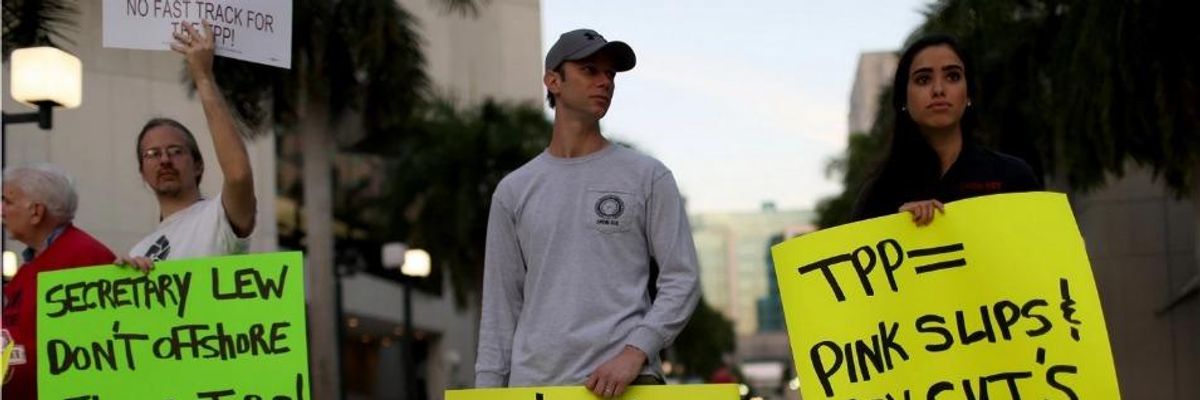"China wants to write the rules for the world's fastest-growing region ... We should write those rules," President Obama declared in his State of the Union address. To sell Congress on giving him authority to "fast track" consideration of the Trans-Pacific Partnership (TPP), a trade and investment treaty with 12 nations that has been under negotiation for five years, the president argues it is vital that "we" write the rules. The real question, of course, is what does he mean by "we"?
Our global trade and tax policies have been and still are controlled by corporate and financial interests. They, not workers or consumers, write the rules. In the early post-World War II years, trade treaties were focused on lowering tariffs. In theory at least, workers in both nations might benefit from larger markets and increased trade. But now a significant portion of our trade is intra-corporate trade, an exchange between one branch of a multinational and another. Multinationals have different interests than national companies. They profit even if U.S. workers suffer. Increasingly companies choose to report their profits or ship their jobs to countries with the lowest standards where the legal position of companies is the strongest. Companies like Wal-Mart set up global distribution systems designed to drive down wages here and abroad. The Waltons are the richest family in the world. Their workers are paid so little that they are forced to rely ontaxpayer subsidies like Medicaid and food stamps.
One product of the corporate-defined trade rules is that the United States has run unprecedented trade deficits, totaling more than $8 trillion since 2000 alone. Trade deficits cost jobs. Worse, companies have used the threat to move jobs abroad to drive down wages here at home. Our corporate-defined trade policies contribute significantly to the reality that, as Nobel Prize economist Joseph Stiglitz writes, "the real median income of a full time male worker is lower now than it was 40 years ago."
With tariffs already low, current trade treaties are focused less on tariffs and trade than on "harmonizing regulations" for investors. But these regulations concern worker rights, consumer and environmental protections, economic policies that are the expression of our democracy. Too often, "harmonization" is simply an excuse for corporations to institute a race to the bottom.
U.S. negotiators forcefully demand other countries pay a price for greater access to the U.S. market. But that price generally involves one or another corporate lobby, not the interests of the American people. So our drug companies get protections against the introduction of generic drugs, driving up prices abroad. Our agribusiness gets protection for its genetically altered foodstuffs. Wall Street gets rules making the sale of arcane derivatives easier.
The TPP is a classic expression of the way the rules are fixed to benefit the few and not the many. It has been negotiated in secret, but 500 corporations and banks sit on advisory committees with access to various chapters. The lead negotiator, Michael Froman, was a protege of former Treasury secretary Robert Rubin, and followed him from Treasury to Citibank, the bank whose excesses helped blow up the economy before it had to be bailed out. Although corporations are wired in, the American people are locked out of the TPP negotiations. And, as Sen. Sherrod Brown (D-Ohio) said, "Members of Congress and their staff have an easier time accessing national security documents than proposed trade deals, but if I were negotiating this deal I suppose I wouldn't want people to see it either."
The brutal negotiations of the TPP haven't been about tariffs but about protections and regulations. Last week, the draft chapter concerning the "Investor-State Dispute Settlement" mechanism was leaked to Wikileaks and the New York Times. Essentially, the chapter allows a company to sue for taxpayer damages if a government (federal, state or local) passes laws or take actions that the company alleges will impinge on future expected profits. The "tribunal" is a panel of lawyers, drawn from a small group of accredited international lawyers who serve both as judges and advocates. If successful the companies can collect millions in damages from governments. The provisions are so shocking that the TPP mandates that the chapter not be declassified until four years after the TPP goes into force or fails to pass.
The administration says we shouldn't worry about this, because the United States has never lost a case and that the dispute mechanism is basically designed to be used on countries with weak or corrupted legal systems. Butas Sen. Elizabeth Warren (D-Mass.) has noted, Philip Morris has already sued Uruguay because of its new anti-smoking regulations that have been lauded globally. A French company sued Egypt for raising the minimum wage; a Swedish company sued Germany for phasing out nuclear power.
How do trade treaties that undermine workers, cost jobs and create a private, corporate global arbitration system get through Congress? The answer, of course, is the corporate lobby that writes the rules mobilizes big money and armies of lobbyists to drive them through. Most Democrats oppose the treaties, but the Wall Street wing of the party tends to support them. Conservatives would naturally oppose secretive global panels that can force taxpayers to pay damages to companies, but the U.S. Chamber of Commerce and the Business Roundtable round up votes to get the treaty passed.
So remember, when the president argues that it is vital that "we" write the rules, "we" means not the American people, but corporate and financial interests.
President Obama has dramatically called inequality the defining challenge of our time. But the reason the 1 percent capture virtually all of the income growth in this society, the reason working families are struggling simply to stay afloat, is that the rules are rigged by the powerful to favor themselves. Our trade policies are clear examples of that. America's middle class will continue to sink until "we" means the American people, not Wall Street and the corporate lobby.

